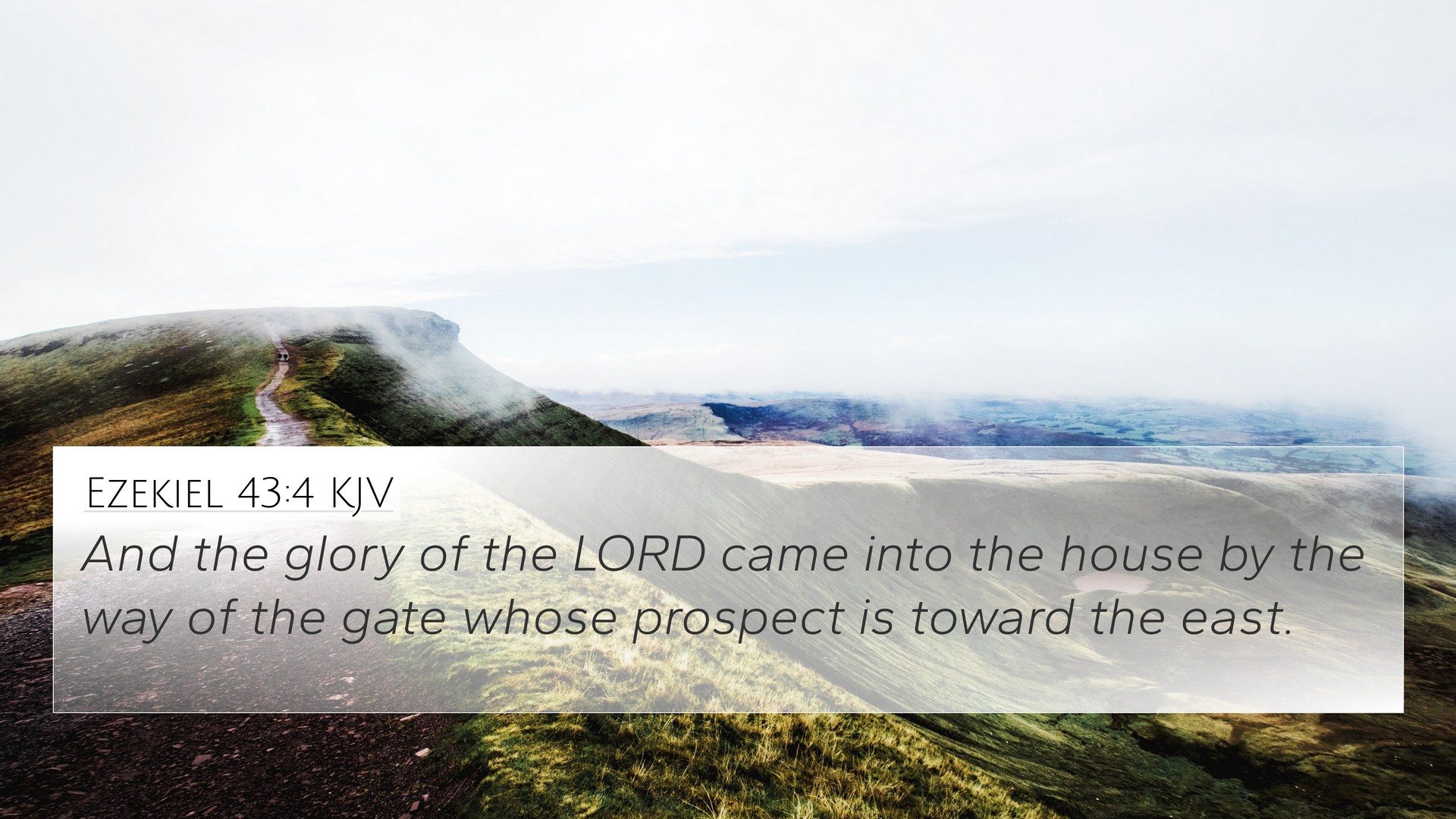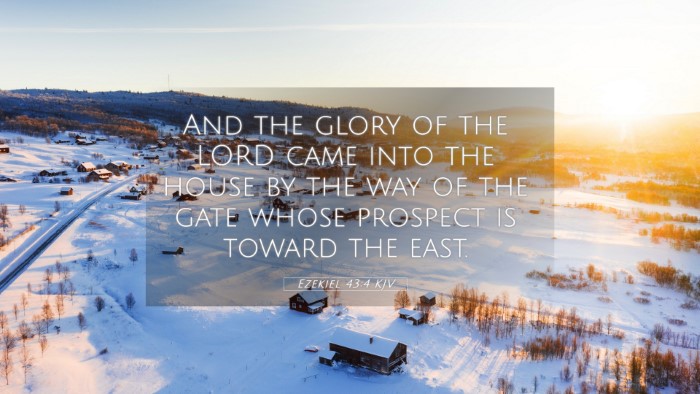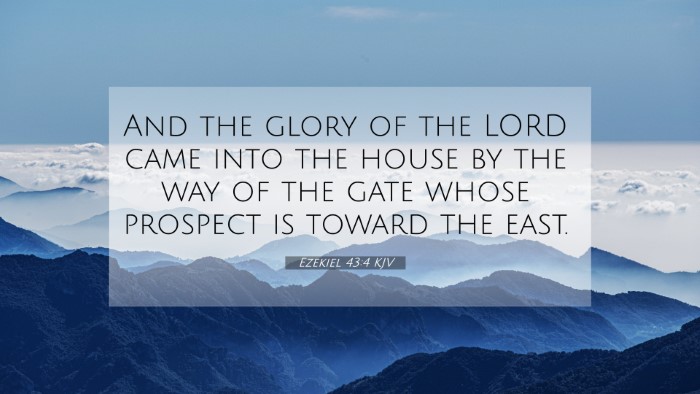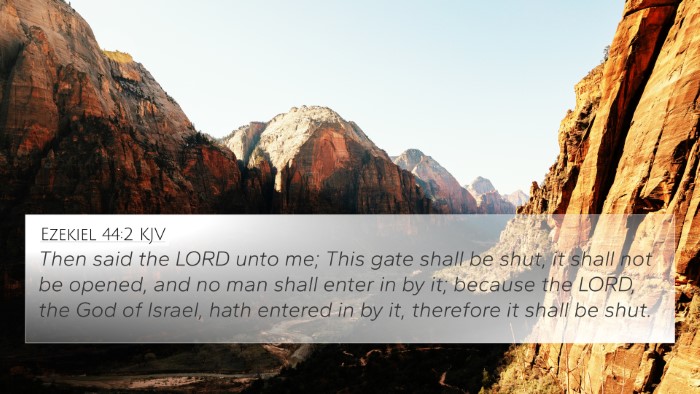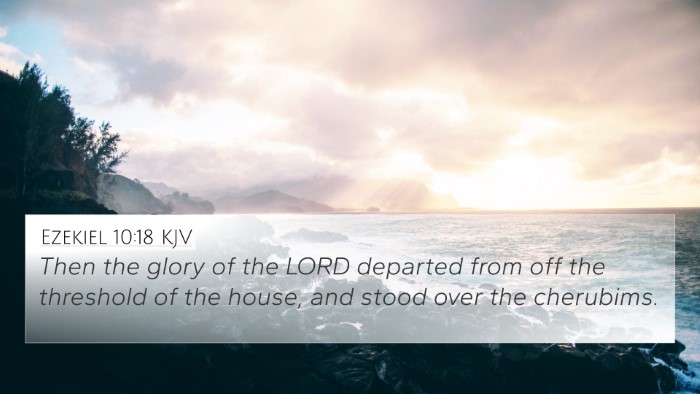Ezekiel 43:4 - Meaning and Interpretation
Bible Verse: Ezekiel 43:4 - “And the glory of the Lord came into the house by the way of the gate whose prospect is toward the east.”
This verse serves as a profound declaration of God's returning glory to His temple, marking a pivotal moment in the prophetic literature of Ezekiel. The commentaries suggest multiple layers of meaning, highlighting the significance of God’s presence and the implications it carries for both the people of Israel and the broader theological narrative.
Summary of Insights
- Divine Restoration: Matthew Henry observes that this moment signifies a restoration of the divine presence among His people, emphasizing that God’s glory is not only central but essential to the life of the community.
- Symbolism of Location: Albert Barnes points out the eastward direction of the gate, interpreting it as a metaphor for hope and renewal, suggesting that God's presence brings light and guidance from that direction.
- Historical Context: Adam Clarke emphasizes the rebuilding phase of Israel and suggests that this verse reflects God's commitment to reestablish the covenant relationship with His people, even after their transgressions.
Thematic Bible Verse Connections
The following Bible verses can be seen as thematic connections that mirror the ideas presented in Ezekiel 43:4:
- Exodus 40:34-35: "Then the cloud covered the tent of the congregation, and the glory of the Lord filled the tabernacle." - Similar to Ezekiel, this highlights the initial filling of the dwelling place by God’s glory.
- Isaiah 60:1-2: "Arise, shine; for your light has come, and the glory of the Lord is risen upon you." - This verse calls attention to the transformative power of God’s glory, promising a new dawn of divine presence.
- Revelation 21:23: "And the city had no need of the sun, neither of the moon, to shine in it: for the glory of God did lighten it." - This portrays the everlasting impact of God’s glory, extending into the New Testament promises.
- Psalms 27:4: "One thing have I desired of the Lord, that will I seek after; that I may dwell in the house of the Lord all the days of my life, to behold the beauty of the Lord." - A personal aspiration that resonates with the return of God's presence.
- Haggai 2:9: "The glory of this latter house shall be greater than of the former, saith the Lord of hosts." - This reinforces the theme of God’s glory in the context of the temple.
- John 1:14: "And the Word was made flesh, and dwelt among us, (and we beheld his glory, the glory as of the only begotten of the Father, full of grace and truth)." - A connection to the ultimate manifestation of God's glory in Jesus Christ.
- Romans 8:18: "For I reckon that the sufferings of this present time are not worthy to be compared with the glory which shall be revealed in us." - Highlights the eschatological aspect of God's glory relevant to believers.
Cross-Referencing Biblical Texts
The insights from commentaries and the thematic connections drawn underline the importance of cross-referencing when studying the Bible. Here are some tools and methods for doing so:
- Bible Concordance: A comprehensive resource that lists words and their occurrences in scripture, useful for finding related verses.
- Bible Cross-Reference Guide: A study tool that aids in identifying verses that illuminate similar themes and concepts.
- Cross-Reference Bible Study: Engaging with these references deepens understanding and unveils the interconnected nature of scripture.
- Bible Chain References: Lists of verses connected to each other in a sequence to provide a broader perspective on specific topics.
- Cross-Referencing Bible Study Methods: Having a systematic approach to link scriptures enhances the study experience and theological insight.
Conclusion
Ezekiel 43:4 encapsulates the essence of God's returning glory, setting a theological precedent that resonates throughout scripture. The embellishment of meanings from various public domain commentaries alongside pertinent biblical cross-references offers a well-rounded understanding of this powerful verse. By leveraging the thematic connections and cross-referencing methods suggested, one can gain deeper insight into the divine narrative and its implications within the life of the believer.
